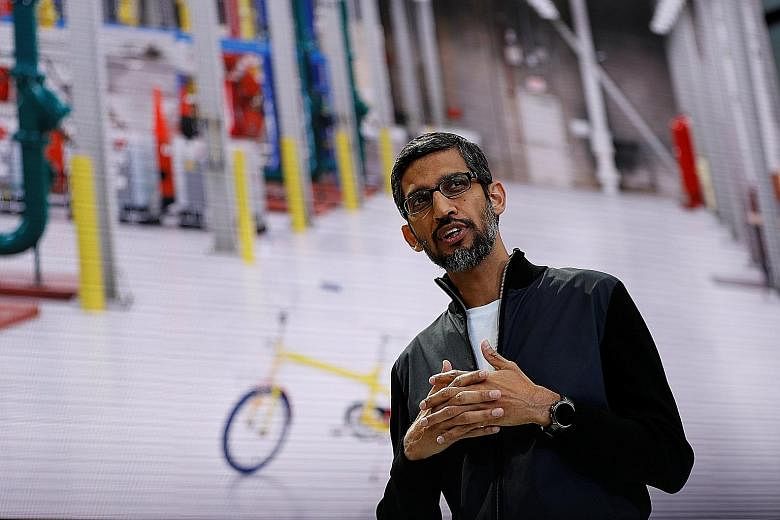The race to capitalise on artificial intelligence (AI) is heating up, following plans by major technology companies over the past month to make AI a central part of their growth strategy.
Tech giant Google's announcement at its I/O 2017 developer conference last week to shift from "mobile-first" to "AI-first" marks "another salvo in the AI arms race among IBM, Google, Microsoft, Baidu and others", said IDC analyst Chwee Kan Chua, global research director for cognitive AI and big data analytics.
This shift is creating new ways for users to interact seamlessly with technology, said Google chief executive Sundar Pichai in his opening keynote address last week, and the company aims to make AI and machine learning the central focus of all its products and services, going forward.
"We are driving (AI) across all our products and platforms," he said. "We now have voice and vision as two new important modalities for computing. Humans are interacting with computing in more natural and immersive ways."
Independent tech analyst Jeff Kagan noted in a column on finance website Equities that Google seems to be taking a different path from other technology companies by making its AI less visible, and doing most of its work from behind the scenes.
"You may not even realise you are interacting with AI when you do things, but you are," he said.
"They are reinventing the Android OS to let them offer AI in many different ways."

Expect to see Google apps and services behave more intelligently, as the company integrates AI into existing apps on its Android mobile operating system.
For example, an update to the Google Photos app will let it recognise photographs of your friends in your camera roll, and recommend that you share these pictures with them through a new photo-sharing feature.
Google's Assistant software, an intelligent personal assistant, has now made its way into the smartphone camera, too.
The company introduced an image-recognition and search software called Google Lens, which lets the camera intelligently see and react to the world around it. For example, users can take a photo of a flower and Lens will identify it for them.
But the AI behind Lens goes beyond that - soon, you can point your camera at a long, complicated Wi-Fi name and password on the back of a router, for example, and the software will see you are trying to access the network and automatically log you into the network based on the log-in information the camera is seeing.
THE A.I. ARMS RACE
A week before Google's AI-centric developer conference, rival tech company Microsoft announced its AI plans at its own Build developer show, which include "infusing" AI into all of its products, such as Xbox, Windows, Bing and Office.
-
Tensor processing units run the show
Google's rapid advancement in artificial intelligence (AI) draws heavily from machine learning, which requires a lot of computational power.
The heavy lifters doing this computing is the company's tensor processing units (TPU), which churn away in the background in data centres worldwide.
At I/O 2017 last week, the company announced the second generation of these chips, which are able to process even more data at a faster rate.
TPUs differ from more commonly known processing units such as central processing units or graphic processing units by being optimised for machine learning.
The new units are capable of 180 teraflops of floating-point performance - which translates to hundreds of trillions of calculations per second.
Up to 64 of these TPUs can be stacked to form a super-computing TPU pod, which can substantially crunch down the amount of time taken to "train" computers to learn by processing large amounts of data.
Mr Jeff Dean, a senior fellow on the Google Brain team, said: "Our new large-scale translation model takes a full day of training on 32 of the world's best commercially available GPUs, while one-eighth of a TPU pod can do the job in just six hours."
The second-generation TPUs will also be made available on the cloud for businesses or researchers who require the computational power for their machine-learning products.
Lester Hio
Even electronics firm Samsung, better known for its hardware than software, is eyeing the AI space, releasing its own dedicated virtual assistant called Bixby on its latest Galaxy S8 smartphone.
In a sea of competing AI services, from Google's Assistant to Microsoft's Cortana to Apple's Siri, consumers will be spoilt for choice on which service best suits their needs.
The form of AI most consumers are likely to interact with will be virtual assistants, now found in practically all smartphones, which can make searches, pull up a music playlist, and even call for an Uber ride - based on just voice commands and intelligently tailoring results to the user.
"Competition is always good for consumers. It will help deliver better user experience and functionalities over time," said IDC's Mr Chwee.
This explains Google's decision during I/O last week to introduce its Assistant software for iPhones where it can battle with Siri to be the AI of choice for iOS users.
"It's pretty simple: When it comes to interactive conversational functions, response time and accuracy are key. Consumers will gravitate quickly to the best performer," said Mr Chwee.


